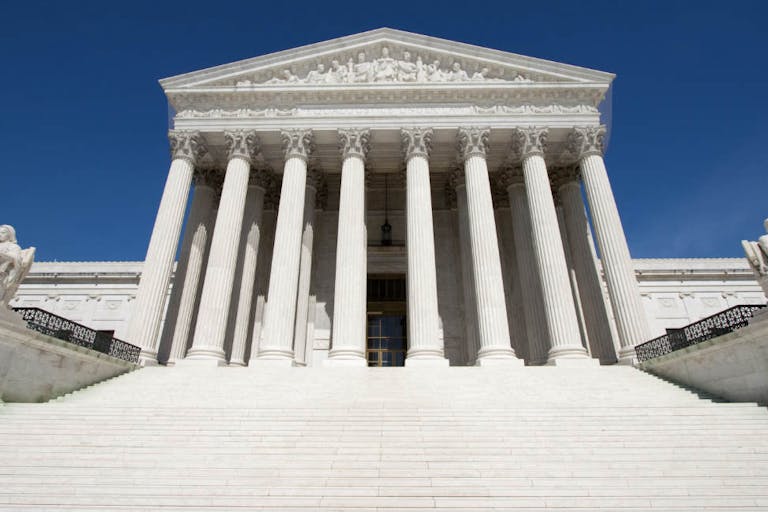We need court reform direly. Overturning Chevron is just another way for extremists to undermine our federal government and therefore democracy in general. Without court reform, the Supreme Court will continue to dismantle our government, setting the stage for a Trump takeover.

How a Supreme Court ruling that limits bureaucratic power could impact abortion
How a Supreme Court ruling that limits bureaucratic power could impact abortion
On June 28, 2024, by a vote of 6-2, the U.S. Supreme Court overruled a 40-year-old legal precedent known as the Chevron Doctrine in Loper Bright Enterprises v. Raimondo. That decision essentially limited the power of federal bureaucrats — which some law experts speculate could impact abortion-related court decisions moving forward.
Noah Feldman, Bloomberg Columnist and professor of law at Harvard University, explained the Chevron Doctrine, which was from a 1984 decision in the case of Chevron v. Natural Resources Defense Council (emphases added):
The basic idea of the Chevron principle was that, when a federal statute is ambiguous, the agency charged by Congress with applying the statute should take a first crack at interpreting the law. Courts would then defer to the agency’s interpretation so long as it was reasonable…
From the start, the legal difficulty with Chevron was that it made agencies, not courts, into the most important interpreters of law… In an opinion by Chief Justice John Roberts, the conservative majority has now officially ripped away that veil of modesty and replaced it with direct supervisory power.
The Supreme Court’s ruling noted, “Under the Chevron doctrine, courts have sometimes been required to defer to ‘permissible’ agency interpretations of the statutes those agencies administer—even when a reviewing court reads the statute differently.”
It also explained that “Courts must exercise their independent judgment in deciding whether an agency has acted within its statutory authority, as the [Administrative Procedure Act] requires… [C]ourts need not and under the APA may not defer to an agency interpretation of the law simply because a statute is ambiguous.”
Laura Hernandez, Senior Counsel with the American Center for Law and Justice (ACLJ), wrote of Chevron: “Interpreting ambiguous federal statutes that are administered by an agency requires the courts to exercise independent judgment. Chevron hamstrings judges from exercising that judgment by allowing administrative agencies to adopt any interpretation that is marginally reasonable — even if it does not reflect the best view of the statute.”
What this means is that now, federal agencies are no longer the exclusive gatekeepers for interpreting federal law. This ruling by the Court could have major impacts on abortion law with regarding to the U.S. Food and Drug Administration (FDA), Title X, Hyde, and beyond. After the Loper decision overturned Chevron, pro-abortion advocates immediately expressed concern.
Pro-abortion groups react with alarm to the Court’s decision
KFF.org speculated at the time that the Loper Bright Enterprises v. Raimondo and Relentless, Inc. v. Department of Commerce cases, “decided jointly… will shape how courts review legal challenges to all regulations that interpret issues where a federal law is ambiguous or silent, including health care.”
Jocelyn Frye, President of the pro-abortion National Partnership for Women & Families, called the decision a “power grab,” writing in a press release:
… [T]he Court is paving the way for far-right extremists to tie up and litigate away our reproductive rights and more in courts for years to come… [and]… could open the door for ultra-conservative judges to dictate the rules that govern contraceptive coverage, prohibit federally funded family planning providers from referring patients for abortion care and expand religious exemptions to undermine our rights and access to care, amidst a host of other potential threats.
At the same time, the Supreme Court continues to evade any meaningful ethics reforms that would shield its own members from the corrupting influence of special interests.
Reproductive Freedom for All, formerly known as NARAL Pro-Choice America, wrote on X, “Overturning Chevron is just another way for extremists to undermine our federal government and therefore democracy in general.” The judiciary is a fundamental part of democratic governments; in the U.S., it is one of three branches of the federal government, put in place with a system of checks and balances.
Ending the Chevron Doctrine “could potentially impact ongoing litigation on HHS’s Title X funding,” the Center for Reproductive Rights (CRR) claimed. “Although the overruling of Chevron deference is not a direct attack on reproductive rights, it still presents new opportunities to whittle away at basic rights, particularly reproductive rights. Congressional interference or micromanagement, coupled with increased administrative delays and litigation, will inevitably be weaponized to attack abortion, contraception, fertility treatment, and a host of other evidence-based practices.”
How the Court’s decision might impact abortion
Regarding the Supreme Court’s ruling in Loper, New York Times author Elizabeth Diaz wrote, “Anti-abortion activists see the ruling as a critical tool to fight the Food and Drug Administration (FDA), especially after the court rejected their bid to undo the F.D.A.’s approval of a medication abortion drug earlier in June… They see the decision as a new precedent as they seek to bring a future case against the F.D.A. to the Supreme Court.”
The Washington Post echoed this, writing that “The 6-3 opinion, which split along ideological lines, could slow rulemaking and lead to a flood of lawsuits challenging decisions made by the Food and Drug Administration and Centers for Medicare and Medicaid Services… Chevron had long been targeted by conservatives who contend federal bureaucrats wield too much power — and the Supreme Court’s conservative supermajority agreed.”
Ian Lopez at BloombergLaw.com added additional insight, writing:
Federal oversight of transgender care, abortion services, drug pricing, and other health policies are more open to legal challenges following the US Supreme Court’s decision to scrap a test for when courts should uphold agency regulation under vague laws.
The US Department of Health and Human Services regulates medicines, insurance, and other areas under ambiguously worded statutes. Congress has often left the specifics in the highly technical and scientific area of health law to HHS and its sub-agencies. Courts have deferred to the agency’s reading of the complex law.
The high court’s June 28 decision to end the Chevron doctrine promises to embolden opponents of an array of HHS regulatory action involving the Health Insurance Portability and Accountability Act (HIPAA), the Affordable Care Act, and Food and Drug Administration safety calls, attorneys say.
Politico echoed this, claiming that overruling the Reagan-era Chevron Doctrine could impact the Affordable Care Act, The Emergency Medical Treatment and Active Labor Act (EMTALA), and the National Institutes of Health.
Loper and ‘Corner Post’ Rulings Impact on Abortion Pill Lawsuits?
In the Alliance for Hippocratic Medicine (AHM) v. Food and Drug Administration (FDA) lawsuit, which challenged the legitimacy of the FDA’s recent expansions of the abortion pill, the High Court ruled that the Plaintiffs (the physicians) did not have standing to bring suit. However, three states who likely do have standing have now been approved to sue.
A companion ruling in a separate case known as Corner Post, Inc. v. Board of Governors of the Federal Reserve System could also impact the AHM case, according to the American Journal of Managed Care (AJMC): “t[T]he combination of the Chevron overturn, and the Corner Post ruling could open up a new set of challenges such that a court might entertain conflicting evidence that second-guesses the FDA’s approval” of the abortion pill mifepristone (200mg), the Journal wrote.
The Corner Post ruling followed the Supreme Court ruling in Loper.
“In other words, even understandings of agency authority that are a half-century old can now be challenged on the ground that some recent agency action, however minor, has injured a plaintiff,” Steve Vladeck, CNN Supreme Court analyst and professor at the University of Texas School of Law, told the media outlet.
“Given how much Friday’s ruling in Loper Bright destabilizes administrative law, today’s ruling [in Corner Post] applies that destabilization retroactively,” Vladeck added.
Article continues below
Dear Reader,
In 2026, Live Action is heading straight where the battle is fiercest: college campuses.
We have a bold initiative to establish 100 Live Action campus chapters within the next year, and your partnership will make it a success!
Your support today will help train and equip young leaders, bring Live Action’s educational content into academic environments, host on-campus events and debates, and empower students to challenge the pro-abortion status quo with truth and compassion.
Invest in pro-life grassroots outreach and cultural formation with your QUADRUPLED year-end gift!
“… [T]hey basically said that the effective date, the statute of limitations effectively for an APA case was not six years from a final regulation but six years from the date that it had an impact on an injured plaintiff. Meaning… you could have regulations that have been on the books for years and years and years, but when they’re applied to a new class or a new plaintiff entity, they could be challenged anew… Read Corner Post hand in hand with Loper Bright,” Dean Rosen, Partner, Mehlman Consulting and former Chief Healthcare Advisor to Senate Majority Leader Bill Frist, stated in a July 2024 webinar organized by KFF.org.
Laurie Sobel, KFF’s Associate Director of Women’s Health Policy, responded:
I think… Corner Post definitely opens up a new set of challenges, particularly for the approval of mifepristone, which was approved in the year 2000. As we know, the plaintiffs that litigated most recently were a newly-formed group, and so they could claim that their injury was new, much like in Corner Post. Whether Loper Bright opens the door to the court second-guessing the FDA’s decision approving drugs based upon scientific evidence is not really quite clear.
The court noted that agency fact-finding and policymaking decisions would be considered under substantial evidence and arbitrary and capricious standard. But it’s possible that a future court would entertain potentially conflicting evidence that’s brought by plaintiffs to say, ‘Well, the FDA didn’t quite look at this or that.’ Decision approving a drug is a final agency decision. I think, in the past, the court has never overturned a drug decision, but I think we might see … there’s challenges ongoing around Mifepristone and whether the court delves into the evidence that the FDA used to base their decision to approve Mifepristone and change the rules around its dispensing is yet to be seen. It’s an open question, I think.
Will the Court’s decision impact Title X family planning?
A July 2024 webinar organized by KFF.org, which discussed the Chevron Doctrine, suggested the Loper case could impact abortion and federal funding of family planning (Title X), among other things. KFF is heavily pro-abortion and Kaiser’s own website lists multiple pro-abortion philanthropists as “funders,” including the Gates and Buffett Foundations.
Their reasoning was that the language of Title X is “ambiguous” regarding the prohibition against federal funds being used in a program “where abortion is a method of family planning.”
A Biden-era rule issue by the Department Health and Human Services (HHS) in 2021 essentially required states receiving Title X grants to “provide neutral, nondirective counseling and referrals for abortions to patients who request it.”
But, when some states outlawed abortion after the Dobbs decision, Biden’s HHS prohibited them from receiving Title X funding.
Mary Anne Pazanowski, legal reporter at BloombergLaw.com, explained, “Oral arguments… will test the US Department of Health and Human Services’ interpretation of Title X of the Public Health Service Act, which the agency says allows it to compel grant program participants to require that providers give pregnant patients information about their options, including abortion if asked. Title X is the only federal program that awards money to operate family planning programs.”
“After Loper Bright, HHS’s interpretation of ambiguous statutes is no longer given deference and HHS cannot hide behind that deference,” Rachel Morrison, director of the Ethics and Public Policy Center’s HHS Accountability Project, told BloombergLaw regarding the Supreme Court ruling. “Regardless, under both Chevron and Loper Bright, it is absurd to think that HHS can take away states’ Title X funding for not providing counseling and referrals for abortions unlawful under state law when Congress explicitly prohibited Title X funds from being used in programs where abortion is a method of family planning.”
BloombergLaw.com added:
John Bursch, senior counsel and vice president of appellate advocacy at Alliance Defending Freedom, said ‘there’s a good chance’ Tennessee will bring up Loper Bright during oral arguments. The Supreme Court’s ruling suggests that HHS’ statement that Title X participants must provide referrals isn’t entitled to deference in light of a federal conscience law that prohibits government discrimination against providers who object to abortion, he said.
Loper Bright requires courts to look at the law itself instead of deferring to an agency’s interpretation of it, Bursch said. Chevron ‘put a thumb on the scale for the government,’ he said; Loper Bright takes that thumb off.
Still, according to BloombergLaw.com, “The Tenth Circuit declined to consider Loper Bright in its July 15 opinion rejecting Oklahoma’s request to have its Title X money reinstated.”
Mary Harned at the Charlotte Lozier Institute (CLI) wrote that “If the new Trump Administration promulgates a Rule modeled after the 2019 [Protect Life] Rule, it will likely be challenged again and will likely be reviewed by the United States Supreme Court.“
Defunding Planned Parenthood
At Townhall.com, Jordan Sekulow, executive director of the pro-life American Center for Law and Justice (ACLJ), suggested the Supreme Court ruling could impact funding to Planned Parenthood.
Sekulow wrote, “When Elon and Vivek laid out their strategy for DOGE in a Wall Street Journal op-ed… to defund entities such as Planned Parenthood, they included three primary tools: regulatory rescissions, administrative reductions, and cost savings. They wrote that they would concentrate on driving reform through executive orders grounded in existing legislation, the U.S. Constitution, and the Supreme Court’s repeal of the ‘Chevron Doctrine,’ which shifted rule interpretation and enforcement power away from federal agencies and back to the courts and Congress….”
Pro-life legal group praises Supreme Court decision
“Last July, ADF attorneys filed a friend-of-the-court brief on behalf of Christian Employers Alliance, urging the court to stop federal agencies from imposing mandates and spending tax dollars that harm the unborn, devalue religious freedom, and contradict biological distinctions based on sex,” Alliance Defending Freedom’s (ADF) founder Alan Sears told Live Action News.
“Federal agencies have driven a nationwide agenda promoting abortion—often in explicit rejection of this Court’s decisions and of state authority—all while imposing mandates and programs that lack statutory authority,” ADF’s brief stated.
“The Biden administration… us[ed] administrative levers to force extreme mandates on the American people that Congress itself has refused to approve…” ADF claimed in video. Those included pouring “tens of millions of dollars into abortion facilities like Planned Parenthood,” “offering money for women to travel to abort their babies,” “order[ing] veterans hospitals and emergency rooms to start performing and completing abortions,” and “creating a 50 state mail order chemical abortion drug economy.”

These actions, ADF claimed, fly “in the face of over 40 years’ worth of Congressional guarantees that taxpayer funds would not be used for abortions” by “creatively reinterpreting laws protecting unborn life that had been on the books since the mid-80s and early-90s.”
“The Constitution grants legislative authority to Congress, not unelected bureaucrats,” ADF’s video added.
ADF later applauded the Supreme Court ruling in Loper, with ADF’s Senior Counsel Julie Marie Blake stating that the Court “rightly held that unelected, unaccountable bureaucrats can’t weaponize federal laws to violate Americans’ most fundamental rights.”
“Federal agency officials frequently disrespect Americans’ most cherished principles—including religious freedom and the sanctity of life—by imposing personal political agendas that Congress has not authorized,” she added.
ADF praised the Supreme Court ruling in Loper, claiming the court “wiped away a major roadblock that prevented Americans from holding government officials accountable.”
“For too long, Chevron v. Natural Resources Defense Council allowed federal agencies to avoid responsibility, and we agree with the court’s decision to overturn it,” wrote Blake. “Not only does this ruling force bureaucrats to do their job; it also protects the First Amendment from being abused by the executive branch. This is a landmark win for the Constitution, the separation of powers, and the rule of law.”
Live Action News is pro-life news and commentary from a pro-life perspective.
Contact editor@liveaction.org for questions, corrections, or if you are seeking permission to reprint any Live Action News content.
Guest Articles: To submit a guest article to Live Action News, email editor@liveaction.org with an attached Word document of 800-1000 words. Please also attach any photos relevant to your submission if applicable. If your submission is accepted for publication, you will be notified within three weeks. Guest articles are not compensated (see our Open License Agreement). Thank you for your interest in Live Action News!
Read Next

Planned Parenthood closes Rolla, MO facility, will continue telehealth
Nancy Flanders
·More In Analysis

Pop Culture
New young adult book promotes abortion
Cassy Cooke
·
Analysis
Twin with Down syndrome selectively aborted during IVF pregnancy
Cassy Cooke
·
Analysis
Judge denies anonymity for victim of forced abortion
Cassy Cooke
·
Analysis
School district to pay millions after student was raped, forced into abortion
Bridget Sielicki
·
Analysis
Abortion supporter harasses peaceful pro-life activist in viral video
Cassy Cooke
·More From Carole Novielli

Abortion Pill
This eBay store is selling the abortion pill, putting women in danger
Carole Novielli
·
Abortion Pill
'Destructive of state sovereignty': Louisiana sues to block mail-order abortion pill expansion
Carole Novielli
·
Investigative
Pregnancy centers continue to surpass brick-and-mortar abortion businesses
Carole Novielli
·
Abortion Pill
Florida and Texas re-file lawsuit challenging abortion pill
Carole Novielli
·
Investigative
Former Planned Parenthood staffer describes how women were coerced and misled
Carole Novielli
·